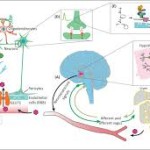 A carbohydrate is an organic compound in foods that are broken down in the body as sugar to be used at the cellular level as energy. They contain both hydrogen and oxygen molecules. The resulting sugar is transported into the cell using insulin that is produced by the pancreas in the body. When there is sugar in the bloodstream, the pancreas secretes insulin.
A carbohydrate is an organic compound in foods that are broken down in the body as sugar to be used at the cellular level as energy. They contain both hydrogen and oxygen molecules. The resulting sugar is transported into the cell using insulin that is produced by the pancreas in the body. When there is sugar in the bloodstream, the pancreas secretes insulin.
Over the last several years the thoughts about carbohydrates have fluctuated. In an effort to reduce cardiovascular disease that results from athrosclerotic plaques in the arteries, doctors recommended low fat diets. However, these diets were usually higher in carbohydrates that increased the blood sugar.
Today, researchers know that the physiologic response to sugar in the body with insulin will result in the production of triglycerides when there is an abundance of glucose. These triglycerides are thought to be responsible for the athrosclerotic plaques that lead to cardiovascular disease, heart attack and stroke.
This is also supported by research that found no increase in heart disease in groups of people who ate a diet higher in saturated fats. This meta-analysis that looked at close to 80 studies and 500,000 subject individuals compared dietary history, fatty acids measured in the blood stream and fatty tissue in the body. The lead researcher also claimed that it is a high carbohydrate and sugar diet that is driving heart risk. (1)
But the link between carbs and disease do no stop with the heart and blood vessels. Large amounts of carbohydrates also leads to obesity because insulin will increase the amount of fat deposited in the body. Carbs change lipid metabolism and expose the body to prolonged amounts of insulin, both of which have been associated with Alzheimer’s disease. Researchers theorize that changing the diet to a lower carbohydrate and higher essential fatty acid nutritional mix may help prevent Alzheimer’s and slow progression of the disease. (2)
There are two types of carbohydrates – simple and complex. The complex carbs are starch and dietary fibers that are found in breads, cereals, grains and some vegetables and fruits. Simple carbohydrates include sugars that are found naturally in foods and also sugars that are added to foods.
The difference between these groups of foods is that in one there is inherent nutritional value in the form of vitamins and minerals and in the other (foods with added sugars) there generally is not. Good carbohydrates may spike your blood sugar but when combined with higher fiber, such as vegetables, they also slow digestion and improve your overall dietary intake.
References:
(1) ScienceDaily: New Evidence Raises Questions About the Link Between Fatty Acids and Heart Disease
http://www.sciencedaily.com/releases/2014/03/140317174502.htm
(2) Medical Hypothese: High Carbohydrate Diets and Alzheimer’s Disease
http://www.ncbi.nlm.nih.gov/pubmed/15082091
Resources:
Scientific American: Carbs against Cardio: More Evidence that refined carbohydrates, no fats, threaten the heart
http://www.scientificamerican.com/article/carbs-against-cardio/
Centers for Disease Control and Prevention: Carbohydrates
http://www.cdc.gov/nutrition/everyone/basics/carbs.html
FAO Corporate Document: Dietary Carbohydrate and Disease
http://www.fao.org/docrep/w8079E/w8079e09.htm
Circulation: Sugar and Cardiovascular Disease
http://circ.ahajournals.org/content/106/4/523.full
Mercola: Low-Protein and Low Carb diet may slow Alzheimer’s Disease
http://articles.mercola.com/sites/articles/archive/2013/03/31/diet-may-slow-alzheimers.aspx
American Journal of clinical Nutrition: A prospective study of dietary glycemic load, carbohydrate intake and risk of coronary heart disease in us women
http://ajcn.nutrition.org/content/71/6/1455.full
Harvard: Carbohydrates and Blood Sugar
http://www.hsph.harvard.edu/nutritionsource/carbohydrates/carbohydrates-and-blood-sugar/


Leave a Reply